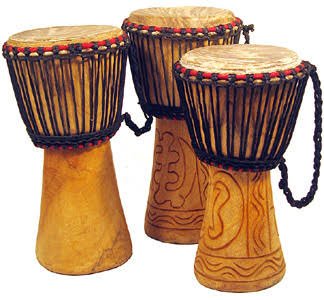African music is not just sound—it’s soul. It’s heartbeat. It’s history. Across the vast and diverse continent, music has always been more than entertainment; it’s been a way to tell stories, mark celebrations, connect with ancestors, and resist oppression.
What’s truly remarkable is how African music has shaped—and continues to shape—global music culture. From jazz to reggae, from hip hop to electronic beats, the fingerprints of Africa are everywhere. In this article, we’ll explore how African rhythms, instruments, styles, and artists have played a major role in defining music worldwide.
Music as Language: The African Tradition
In traditional African societies, music is not separate from daily life—it’s part of the fabric of existence. There’s music for birth, for work, for war, for mourning, and for celebration.
Take drumming, for instance. African drums like the djembe, talking drum, and sabar aren’t just percussion instruments—they’re communicative tools. Some, like the talking drum of the Yoruba people, can imitate human speech to send messages across distances.
Call and response, a hallmark of African music, fosters connection between performer and audience. It’s about unity. It’s about shared emotion. And it laid the groundwork for many Western music traditions.
The Diaspora Effect: African Roots Abroad
Much of the influence of African music around the world comes from the African diaspora, particularly through the transatlantic slave trade. Though tragic, this forced migration carried African rhythms to the Americas and the Caribbean, where they blended with other cultural influences to birth entirely new genres.
Let’s look at a few key examples:
1. Jazz and Blues – USA
African musical traits—like blue notes, improvisation, and syncopation—formed the backbone of the blues, which then evolved into jazz. These genres emerged in African-American communities and owe a great deal to African spirituals and work songs.
2. Reggae – Jamaica
Reggae music, rooted in the Rastafarian movement, draws heavily from African drumming, spirituality, and resistance messaging. Artists like Bob Marley became global icons, but at its core, reggae is deeply African in soul and rhythm.
3. Samba and Capoeira – Brazil
In Brazil, African slaves brought musical styles that evolved into samba and capoeira (a martial art that incorporates music and dance). These are now national symbols of Brazilian culture.
Modern Global Genres Influenced by African Music
African rhythms didn’t just contribute to early genres—they continue to influence modern music in real-time. You can hear African sounds in pop, EDM, hip hop, and even classical compositions.
Afrobeats: Africa to the World
One of the most prominent examples is Afrobeats (not to be confused with Afrobeat, the genre pioneered by Fela Kuti). Afrobeats is a vibrant blend of West African pop, highlife, hip hop, dancehall, and R&B.
Artists like Burna Boy, Wizkid, Tems, and Davido are selling out arenas globally, collaborating with international stars like Beyoncé, Drake, and Ed Sheeran. Afrobeats isn’t just music—it’s a movement. It’s made African music cool, current, and unstoppable.
Amapiano: The South African Sound Taking Over
From the townships of South Africa, Amapiano has burst onto the global scene with its smooth piano melodies, log drum basslines, and laid-back vibes. Originating in the mid-2010s, Amapiano has taken over clubs, TikTok trends, and charts.
Artists like Kabza De Small, DJ Maphorisa, and Uncle Waffles are pioneering a sound that feels uniquely African—and yet instantly global.
Traditional Meets Contemporary: Keeping Heritage Alive
What’s exciting about African music today is how traditional styles are merging with modern ones. Artists are sampling old chants, using indigenous languages, and playing traditional instruments alongside synthesizers and trap beats.
For example:
-
Angelique Kidjo, the Beninese Grammy-winner, effortlessly blends Afrobeat, funk, and traditional rhythms.
-
Sauti Sol, a Kenyan band, mixes Benga music with soul and pop.
-
Fatoumata Diawara, from Mali, uses Wassoulou traditions in her guitar-driven world music.
This blend keeps African heritage alive while making it accessible to younger, global audiences.
The Cultural Power of African Music
African music does more than entertain—it educates, empowers, and unites. Throughout history, music has been a form of protest, a tool for healing, and a call to action.
Political Resistance
From Fela Kuti’s scathing critiques of Nigerian corruption, to Miriam Makeba’s fight against apartheid through music, African artists have long used their voices to speak truth to power.
Even today, songs address police brutality, youth unemployment, gender issues, and inequality. Music becomes a space for dialogue when other platforms are silenced.
Unity and Identity
In a continent with over 2,000 languages and countless ethnic groups, music also serves as a unifier. Pan-African collaborations, festivals, and music competitions bring people together across borders.
Events like Afronation, Cape Town Jazz Festival, and Lake of Stars highlight the diversity and richness of the continent’s soundscape.
African Music in Film, Fashion, and Pop Culture
The reach of African music extends beyond the charts. It’s influencing fashion (think Ankara styles in music videos), choreography (Afrobeats dance trends are everywhere), and film.
The success of movies like Black Panther (with a soundtrack by Kendrick Lamar and African artists) and The Woman King proves that African music can set the emotional tone for storytelling on a global stage.
Even platforms like Netflix and Spotify are investing in African music content, and TikTok trends often explode with African dance challenges and remixes.
Africa’s Soundtrack to the World
Africa has always been the heartbeat of global music—whether it was recognized or not. Today, with digital platforms, growing appreciation for diversity, and a new generation of proud African creatives, the world is finally tuning in.
And the beauty of it all? This is just the beginning.
African music is not a wave—it’s the tide. It’s always been here. It’s vibrant, ancient, future-facing, and limitless.
At Afriker.com, we’ll keep celebrating, documenting, and promoting this cultural goldmine—because when Africa sings, the world listens.

